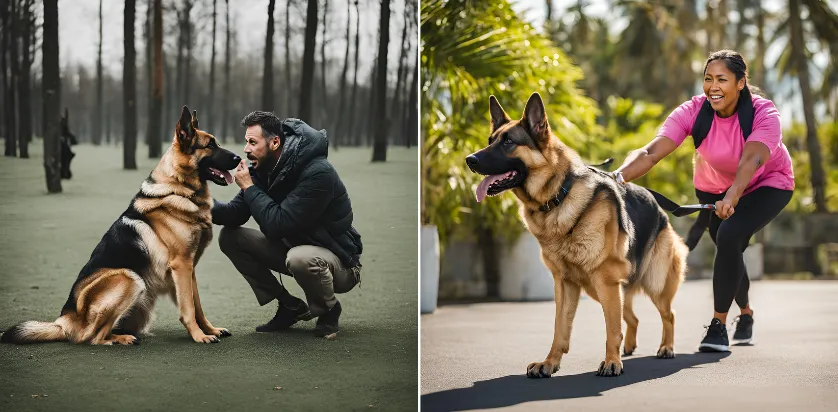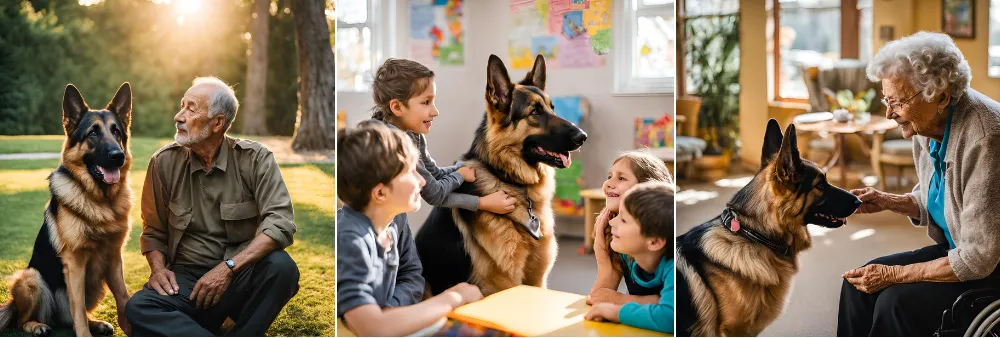German Shepherds have long been celebrated for their loyalty, intelligence, and versatility. Known as one of the most trainable and adaptable dog breeds, they are commonly employed in roles ranging from police work to search-and-rescue operations.
However, there’s a lesser-known side to these remarkable dogs is their ability to serve as effective therapy (the treatment of mental conditions by verbal communication and interaction) and emotional support companions.
With the right temperament and training, German Shepherds make an ideal breed for supporting people with mental health and emotional well-being challenges.
Following topics will be covered in this post:
- The Unique Characteristics of German Shepherds
- Why German Shepherds Are Ideal for Therapy Roles
- Emotional Support German Shepherds
- Specialized Training for German Shepherd Therapy and Emotional Support Roles
- Success Stories of German Shepherd Therapy and ESA Work
- Considerations for Choosing a German Shepherd as a Therapy or ESA
RELATED
- Monthly & Annual Expenses of Owning a German Shepherd
- What are Challenges of Training & Raising German Shepherd?
- What is the Average Intelligence of German Shepherds?
- How to Determine Most Desirable Traits in German Shepherd?
- Male or Female German Shepherd: Which One is Better?
- Common German Shepherd Health Myths Debunked
|| DON’T MISS! Today’s Deals on Chewy – Pet Foods, Products, Supplies, Toys and more. Additionally, visit our Etsy & Online Store for German Shepherd merchandise.
01. The Unique Characteristics of German Shepherds
German Shepherds possess a blend of traits that make them particularly well-suited to therapy and emotional support work. Known for their loyalty and strong bonding instincts, they develop deep attachments to their handlers. This is a critical trait for therapy and support dogs, as it fosters a sense of security and trust in individuals who may struggle with feelings of isolation or anxiety.
Additionally, German Shepherds are highly intelligent and can quickly adapt to complex routines and varied tasks. This intelligence, combined with their eagerness to learn and please, makes them easier to train for specialized roles, including emotional support tasks.

02. Why German Shepherds Are Ideal for Therapy Roles
Therapy dogs play a unique role by visiting hospitals, nursing homes, schools, and even disaster sites to provide comfort and emotional support to people in distress.

Below are the reasons why German Shepherds excel in these roles:
- German Shepherds are known for their perceptiveness, often picking up on subtle changes in their handler’s emotions. They are quick to respond to signs of distress and can be trained to offer comforting physical presence or distraction techniques.
- Due to their size and strength, German Shepherds exude a calm and protective presence, which can be immensely reassuring for individuals dealing with stress, grief, or trauma.
- Therapy sessions in busy or loud environments can be stressful for dogs, but German Shepherds’ endurance and ability to adapt to new environments make them more resilient to such challenges. This allows them to remain calm and focused, providing stability to those around them.
03. Emotional Support German Shepherds
Emotional Support Animals (ESAs) provide constant companionship to individuals who struggle with emotional or mental health issues, such as anxiety, depression, or PTSD(Post-traumatic Stress Disorder).

Though German Shepherds are not always the first breed that comes to mind for these roles, their characteristics make them surprisingly well-suited:
- An ESA’s primary role is to offer companionship and a sense of stability and dependability, which German Shepherds excel at due to their protective and loyal nature.
- Individuals who suffer from mental health disorders often benefit from routines, and German Shepherds thrive on predictable routines as well. This mutual need for structure can strengthen the bond between the dog and the handler.
- Unlike smaller breeds, German Shepherds require regular exercise and mental stimulation, which can encourage their handlers to engage in physical activities like walks and playtime. This activity is beneficial for individuals facing depression or anxiety as it promotes physical wellness and establishes a sense of normalcy.
04. Specialized Training for German Shepherd Therapy and Emotional Support Roles
While German Shepherds are naturally intelligent and empathetic, specialized training is essential to ensure they can fulfill the role of a therapy or emotional support animal.

Here are some key training elements:
- German Shepherds are naturally protective, so extensive socialization is crucial. Therapy dogs, in particular, must feel comfortable with strangers and handle diverse environments calmly. Early exposure to a variety of people, animals, and environments helps them develop a relaxed demeanor.
- Obedience training is necessary to ensure a reliable response to commands. Commands like “sit”, “stay”, and “come” help control the dog in a range of settings, ensuring they can behave appropriately in public places.
- Emotional support German Shepherds can be trained to perform specific tasks such as nudging their handler during a panic attack, grounding behaviors (applying gentle pressure to provide comfort), or waking them from nightmares. These tasks provide concrete support for those suffering from anxiety, PTSD, or other mental health challenges.
05. Success Stories of German Shepherd Therapy and ESA Work
Many success stories illustrate how German Shepherds have significantly impacted the lives of individuals they support.
In nursing homes, German Shepherds have also been known to boost morale and alleviate feelings of loneliness among residents, helping them reconnect with the outside world.

For instance, they have been instrumental in helping veterans with PTSD by offering companionship and reducing symptoms associated with anxiety and hypervigilance.
In schools, German Shepherd therapy dogs have shown positive results when working with children who experience social anxiety or autism. Their presence can create a calming effect, helping students feel more comfortable and engaged in the classroom.
06. Considerations for Choosing a German Shepherd as a Therapy or ESA
While German Shepherds can excel in these roles, there are factors to consider before choosing one as a therapy or ESA dog:
- Not all German Shepherds have the temperament for therapy work. Always bring a German Shepherd from a reputable breeder. Selecting a dog with a naturally calm, confident, and gentle demeanor is crucial to avoid potential issues in high-stress environments.
- German Shepherds require regular exercise, mental stimulation, and grooming. Future handlers must be prepared for the commitment involved in caring and maintaining a German Shepherd.
- German Shepherds are large, active dogs, and handlers need adequate space and time to meet their exercise and movement needs.
RELATED
- How to Raise German Shepherd Puppy at Home
- Training German Shepherds for Families With Young Children
- Is German Shepherd Right for Apartment Living?
- Best Way to Take German Shepherd for Walk: A Complete Guide
- Effective Methods for Crate Training German Shepherd Puppy
- How to Tell if German Shepherd Feels Comfortable Around You
Conclusion
The potential of German Shepherds as therapy and emotional support animals is often underestimated. Their intelligence, loyalty, and adaptability make them well-suited for roles that require emotional sensitivity and calm resilience.
By providing companionship, stability, and trained support, German Shepherds can make a profound difference in the lives of those dealing with emotional and psychological challenges.
Recognizing the potential of German Shepherds in these supportive roles can open doors to broader applications of their abilities, offering comfort, healing, and connection to those in need. With the right training and guidance, German Shepherds can be invaluable allies, standing by as loyal, compassionate partners in the journey toward emotional well-being.
If you like this post then don’t forget to share with other people. Share your feedback in the comments section below.




Leave a Reply